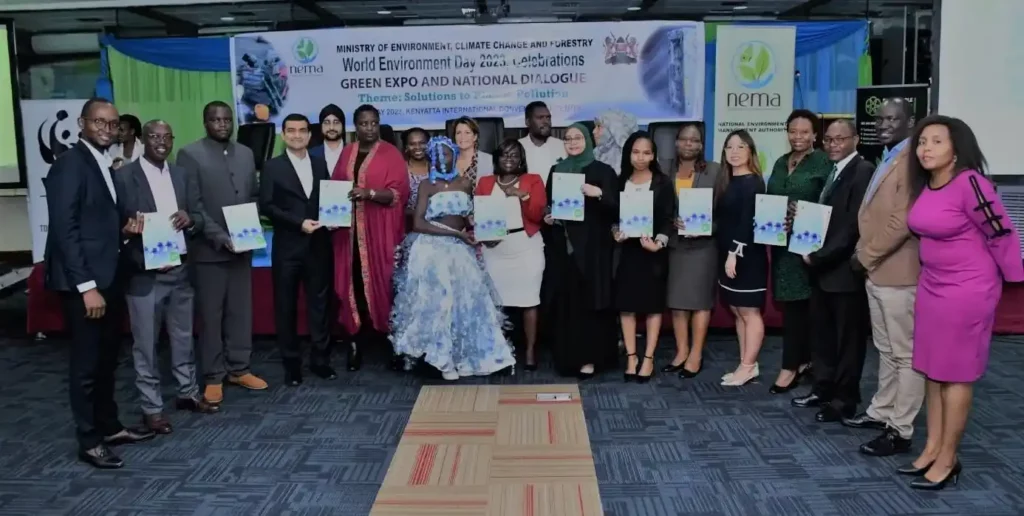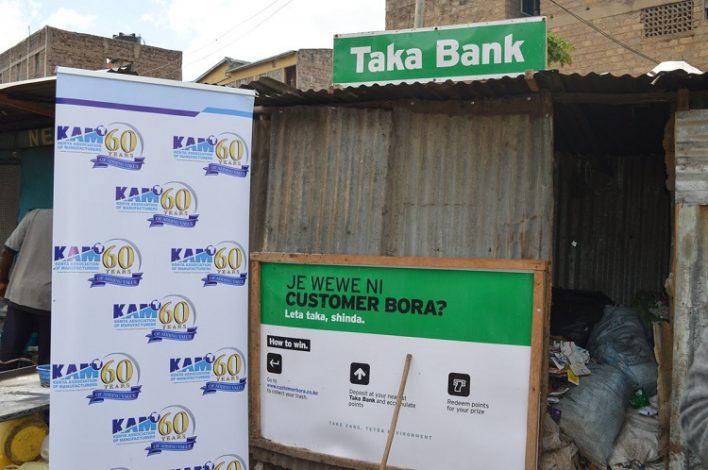The Kenya Plastics Pact released its first version of the Design Guidelines for Recyclability in Kenya, for PET Bottles and HDPE Bottles & Jars, during the Pre-World Environment Day National Dialogue which took place May 31st in Nairobi.
The guidelines are in line with the Pact’s second target which aims to ensure that 100% of plastic packaging is reusable or recyclable in the country by 2030, and with the 2023 World Environment Day theme dubbed, “Beat Plastic Pollution”.
“Addressing plastic pollution requires collective action at multiple levels. It entails strengthening waste management systems, promoting sustainable practices, investing in recycling infrastructure, enforcing regulations, and fostering behaviour change. This landmark milestone will provide clear recommendations to decision-makers on how to design plastic packaging to be compatible with the current (and future projections of) mechanical recycling infrastructure and will go a long way in pushing for solutions to plastic pollution at the design level,” said Carole Kariuki, the CEO of the Kenya Private Sector Alliance, in her remarks presented by Dr John Wandaka, KEPSA Vice-Chair of the Environment, Water and Natural Resources Sector Board.
The guidelines have been reviewed by the National Environment Management Authority (NEMA), and approved by all 40 official Members and Supporters of the Pact including plastic packaging manufacturers, importers, and exporters, prominent FMCG brands, committed small and medium businesses, informal waste pickers’ associations and recyclers, influential industry associations, environmental NGOs, and advocacy groups/civil society.
“The systemic challenge raised by this environmental crisis lies at the heart of the Pact, and we are proud of our Members for committing to our set targets and to the guidelines and going beyond to incorporate them into their corporate sustainability agendas. Together we will create a circular economy for plastics where it stays in the economy and does not end up in the environment,” said Karin Boomsma, the project lead at the Kenya plastics pact.

The unregulated dumping and plastics packaging ending up in landfills pose a critical and often immediate threat to countless endangered species, ecosystems and dependent socio-economic systems all over the country.
Some factors that affect the recyclability of packaging material are the additives, such as coatings, caps seals and liners. These additives make the sorting process more complicated and if mixed, will contaminate the recycled product.
In recent years, a growing demand for greater sustainability in packaging design has been apparent. Sustainable packaging incorporates functionality and the protection of products while keeping its ecological footprint to a minimum and enabling reuse and recycling.
To achieve higher material recycling rates and move towards circularity, the guidelines emphasize the need to rethink the design of packaging to improve its future recyclability while guaranteeing its functionality.
Consequently, the Kenya Plastics Pact also announced the launch of the “Let’s Be Clear Challenge”, an Innovation Challenge in partnership with WWF-Kenya. The innovation challenge will increase awareness, scale willingness and ensure commitment towards the design guidelines for recyclability.
“Being a global crisis, pollution, especially from plastic waste, demands a systems approach to combat it. With all relevant partners, we have continuously and jointly created forums, generated conversations and undertaken ideation processes to propose and implement innovative solutions towards sustainable waste management in this country. We are now witnessing one of the fruits of the collaboration between WWF-Kenya, Sustainable Inclusive Business and KEPSA, with the launch of the Design Guidelines for Recyclability in Kenya under the Kenya Plastics Pact,” said Jackson Kiplagat, the Head of Conservation Programs at WWF-Kenya.
Simply, plastic packaging is recyclable when it can be recycled. Based on the Ellen MacArthur Foundation’s Global Commitment, the Kenya Plastics Pact explains the definition as follows: a packaging or a packaging component is recyclable if post-consumer collection, sorting, and recycling are proven to work in practice and at scale. The design guidelines are presented in three categories, signifying compatibility with recycling:
- GREEN: Packaging features that are generally compatible with or separable from the main material and are acceptable in recycling processes in large volumes.
- YELLOW: Packaging materials that are recyclable in some applications, but could contaminate the recycling process.
- RED: Packaging items and materials that are generally not compatible with the current recycling systems or not separable from the main material in current processes will contaminate the recycling process.
During the launch, the Pact received commitments from businesses and innovators including Coca-Cola, Biofoods, Bidco Africa, and Takataka Solutions; which showcased the power of the guidelines and the impact they will have on the plastics value chain.
The guidelines are designed to inspire, inform and motivate all stakeholders to improve and increase recycling and reduce unnecessary and problematic plastic packaging.
“As members of the Kenya Plastics Pact, we remain committed to creating a circular economy to reduce the use of plastics. Thus, we have invested more than USD 100,000 towards reducing plastics in our beverages and plastic products, which aligns greatly with the just launched innovation developments. One of the initiatives we’re taking towards reducing plastics is the removal of the plastic seal in the country’s leading water brand Planet Aqua. We will consciously continue to improve this over the coming years and implement our ESG and SDGs,” affirmed the Head of Beverages and Snacks at BIDCO Africa, Mr Tushar Mehta.
The Kenya Plastics Pact aims to further eliminate unnecessary or problematic single-use plastic packaging items through redesign, innovation, and reuse delivery models; ensure that at least 40% of plastic packaging is recycled and have at least 15% average recycled content across all plastic packaging by 2030. These guidelines will be regularly updated and amended in response to changes in the collection, sorting, recycling technologies and infrastructure in Kenya.



